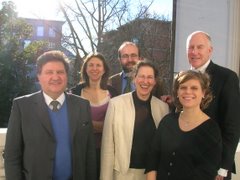mediation is progressing in Italy!
Good. Because it is a practice intrinsecally related to argumentation.
See the article on the website of the Italian Government
http://www.governo.it/GovernoInforma/Dossier/mediazione_civile/index.html
Pagina pubblicata il 29 ottobre 2009 e modificata il 16 novembre 2010
Presentazione
"La mediazione? Semplice ed efficace" recita lo slogan della nuova campagna di comunicazione finalizzata a far conoscere alla cittadinanza lo strumento giuridico della mediazione civile per la risoluzione delle controversie, come alternativa al processo ordinario.
L'avvio della campagna di comunicazione coincide con l'entrata in vigore del decreto ministeriale che istituisce il registro dei mediatori. Dal marzo 2011 il tentativo di mediazione fra le parti, in caso di controversie civili, diventa obbligatorio.
Obiettivo del nuovo istituto giuridico è disincentivare il ricorso in tribunale, con la conseguenza di veder ridurre progressivamente l’arretrato che grava sul sistema giustizia. La mediazione civile, infatti, è lo strumento scelto per ''deflazionare il sistema giudiziario italiano rispetto al carico degli arretrati e al rischio di accumulare nuovo ritardo'', ha detto il ministro della Giustizia, Angelino Alfano, nel corso della conferenza stampa al termine del Consiglio dei ministri del 29 ottobre 2009 che ha visto l’approvazione dello schema di decreto legislativo. Il decreto legislativo è stato approvato in via definitiva dal Consiglio dei ministri del 19 febbraio 2010, dopo aver acquisito i prescritti pareri da parte delle commissioni parlamentari.
La mediazione è veloce ed economica.
Il procedimento di mediazione, infatti, non è soggetto ad alcuna formalità ed è protetto da norme che assicurano alle parti del procedimento l’assoluta riservatezza rispetto alle dichiarazioni e alle informazioni emerse. Tali informazioni non possono essere utilizzate in sede processuale, salvo esplicito consenso delle parti, e il mediatore è tenuto al segreto professionale su di esse. Inoltre, il mediatore è nominato non oltre quindici giorni dal deposito della domanda presso l’organismo di mediazione e il procedimento di mediazione ha una durata non superiore a quattro mesi, trascorsi i quali il processo può iniziare o proseguire.
Sono infine previste agevolazioni fiscali per coloro che ricorrono alla mediazione.
Tutti gli atti relativi al procedimento di mediazione sono, infatti, esenti dall’imposta di bollo e da ogni altra spesa, tassa o diritto di qualsiasi specie e natura. In particolare, il verbale di conciliazione sarà esente dall’imposta di registro sino all’importo di 50.000 euro, altrimenti l’imposta è dovuta per la parte eccedente.
In caso di successo della mediazione, le parti avranno diritto a un credito d’imposta fino a un massimo di 500 euro per il pagamento delle indennità complessivamente dovute all’organismo di mediazione. In caso di insuccesso della mediazione, il credito d’imposta è ridotto della metà.
La mediazione civile è, dunque, un importantissimo strumento alternativo di risoluzione delle controversie civili, finora previsto solo come facoltativo ai procedimenti ordinari che si svolgono nelle aule dei tribunali.
Uno strumento, tuttavia, ancora poco conosciuto dai cittadini, ma in grado di rendere decisamente più rapidi i tempi della giustizia civile e di incidere fortemente sullo smaltimento dell'enorme arretrato di cause civili.
Fonte: Ministero della Giustizia
Redazione Internet governo.it
Thursday, 18 November 2010
Wednesday, 10 November 2010
Argumentation and Learning
I have been away for a while, totally "absorbed" in my new project on argumentation in international migration. A fascinating topic that is also bringing me to meet a lot of "migrating mums" living in London whose stories speak of family debates, inner argumentation and many other interesting things.
But well I have a good reason to come back today i.e. to announce the publication of a website of the international Colloquium on Argumentation and Learning (Lausanne, December 2010). Have a look to it:
http://argumentationandeducation.wikispaces.com/
But well I have a good reason to come back today i.e. to announce the publication of a website of the international Colloquium on Argumentation and Learning (Lausanne, December 2010). Have a look to it:
http://argumentationandeducation.wikispaces.com/
Monday, 20 September 2010
An Essay in aid of a Grammar of Assent
The State visit of the Pope to England has been the subject of a vivid debate on the media recently. Yet this is not the only reason why it is relevant from the argumentative point of view. On Sunday, the
beatification of cardinal John Henry Newman was celebrated. For me, this was the occasion to have a look to some of the writings of this man and cardinal, in particular to "An Essay in aid of a Grammar of Assent", which, in many respects, is relevant to argumentative studies.
I will just quote a passage here:
There is another reason for attempting to discover an instrument of reasoning (that is, of gaining new truths by means of old), which may be less vague and arbitrary than the talent and experience of the few or the common-sense of the many. As memory is not always accurate, and has on that account led to the adoption of writing, as being a memoria technica, unaffected by the failure of mental impressions,—as our senses at times deceive us, and have to be corrected by each other; so is it also with our reasoning faculty. The conclusions of one man are not the conclusions of another; those of the same man do not always agree together; those of ever so many who agree together may differ from the facts themselves, which those conclusions are intended to ascertain. In consequence it becomes a necessity, if it be possible, to analyze the process of reasoning, and to invent a method which may act as a common measure between mind and mind, as a means of joint investigation, and as a recognized intellectual standard,—a standard such as to secure us against hopeless mistakes, and to emancipate us from the capricious ipse dixit of authority.
From:
An Essay in aid of a Grammar of Assent, Chapter 8 section 1 (See the full text)
beatification of cardinal John Henry Newman was celebrated. For me, this was the occasion to have a look to some of the writings of this man and cardinal, in particular to "An Essay in aid of a Grammar of Assent", which, in many respects, is relevant to argumentative studies.
I will just quote a passage here:
There is another reason for attempting to discover an instrument of reasoning (that is, of gaining new truths by means of old), which may be less vague and arbitrary than the talent and experience of the few or the common-sense of the many. As memory is not always accurate, and has on that account led to the adoption of writing, as being a memoria technica, unaffected by the failure of mental impressions,—as our senses at times deceive us, and have to be corrected by each other; so is it also with our reasoning faculty. The conclusions of one man are not the conclusions of another; those of the same man do not always agree together; those of ever so many who agree together may differ from the facts themselves, which those conclusions are intended to ascertain. In consequence it becomes a necessity, if it be possible, to analyze the process of reasoning, and to invent a method which may act as a common measure between mind and mind, as a means of joint investigation, and as a recognized intellectual standard,—a standard such as to secure us against hopeless mistakes, and to emancipate us from the capricious ipse dixit of authority.
From:
An Essay in aid of a Grammar of Assent, Chapter 8 section 1 (See the full text)
Sunday, 12 September 2010
The role of argumentation in British education: an historical glimpse
Recently I was surprised by the description that Niall Ferguson makes of the (very competitive) exams that were proposed to candidates for the Indian Civil Service (the administration of the British colonies). I do not have the intention to discuss imperialism here. Ferguson wrote a brilliant essay about the British empire (Empire: How Britain made the modern world, Penguin, 2003),which I am going to cite (pp. 185-186).
I was impressed by some of the questions that candidates were asked in 1859 for their exams. The historical questions are interesting: "Enumerate the chief Colonies of England, and state how and when she acquired each of them", or "Name the successive Governors-General of British India as far as 1830, giving the dates of their Governments, and a brief summary of the main Indian transactions under each" (!). But together with these questions, the "Logic and Mental Philosophy paper" includes this one: "Classify Fallacies".
Really, I am impressed. The British administrators/governors of the colonies were asked to know some fundamentals of argumentation. I do not want to draw conclusions about British colonies, but it is an interesting clue to what the educational requirements were for a man who should work in an institutional domain.
I was impressed by some of the questions that candidates were asked in 1859 for their exams. The historical questions are interesting: "Enumerate the chief Colonies of England, and state how and when she acquired each of them", or "Name the successive Governors-General of British India as far as 1830, giving the dates of their Governments, and a brief summary of the main Indian transactions under each" (!). But together with these questions, the "Logic and Mental Philosophy paper" includes this one: "Classify Fallacies".
Really, I am impressed. The British administrators/governors of the colonies were asked to know some fundamentals of argumentation. I do not want to draw conclusions about British colonies, but it is an interesting clue to what the educational requirements were for a man who should work in an institutional domain.
Wednesday, 8 September 2010
New (personal) website
On September 1, I started my stay as a visiting lecturer at University College London. On this occasion, I opened a new personal website, on which you can read all my present research interests and download some pre-prints of my publications: Sara Greco Morasso's webpage
I also have a homepage on Academia.edu: http://ucl.academia.edu/SaraGrecoMorasso, which I am trying to keep up-to-date. I believe this is a network that will certainly grow bigger, because you can 'meet' international colleagues in your research area, see their publications and informally follow their work.
I also have a homepage on Academia.edu: http://ucl.academia.edu/SaraGrecoMorasso, which I am trying to keep up-to-date. I believe this is a network that will certainly grow bigger, because you can 'meet' international colleagues in your research area, see their publications and informally follow their work.
Subscribe to:
Posts (Atom)


